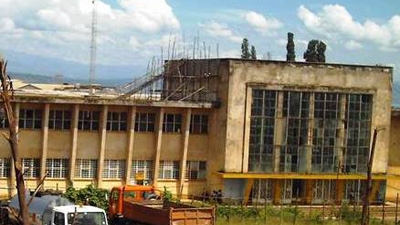BUKAVU, March 9, 2012– The old postal building in Bukavu, the capital city of DR Congo’s South Kivu province, now boasts a new look. Its outside walls have been repainted beige. After passing through the main building entrance, visitors see an inside courtyard with a leafy garden filled with flowers. The old building has undergone major improvements since January 2010. Inside, construction workers are still busy replacing an aging ceiling and doing electrical rewiring. “This facelift is one of the results of the Enhancing Governance Capacity project,” explains Jean Serge Bikoro, the provincial project coordinator.
The provincial government offices will be housed in the renovated building, which will undoubtedly improve working conditions. Thanks to the project, Bikoro says, about one hundred staff and officials have received computer training, along with a large amount of office equipment (desktop computers, printers, photocopiers, inverters). The expenditure chain is also being automated, with a view to improving the provincial institutions’ public sector and financial management systems.
Good Governance Contracts
The Enhancing Governance Capacity project was launched in 2008 and received US$50 million in financing from the World Bank. Its main goals are to enhance transparency and efficiency in public finance and human resource management at the national and local levels, as well as establish and consolidate an equitable resource sharing mechanism between the central government in Kinshasa and sub-national governments across the provinces. The project initially planned to finance activities at the central level and in three pilot provinces (South-Kivu, Katanga and Bandundu), however, the program was also extended to Kasai-Occidental in order to avoid a two-track decentralization process.
In each of these provinces, the project supports activities for the creation of revenue collection structures, automation of the provincial expenditure chain and provincial revenue, and adoption of procurement reforms. “The project was a crucial instrument for the provincial governments during the last government’s term of office,” said the World Bank project leader, Jean Mabi Mulumba. “Thanks to this project, the governments of the three pilot provinces were able to improve the budget process, with realistic forecasts. In addition, support for the creation of provincial revenue collection structures made these pilot provinces less financially dependent on the central government in Kinshasa.”
Besides receiving expert advice from the project team, provincial ministries and sectoral departments also received institutional support to improve their management methods. They concluded a governance contract to improve their management and introduce transparency in the areas of justice, administration, mining, land use, agriculture and health.
In Bukavu, citizens are anxious to see these reforms pay off. Recent political instability in the province―which had three governors within three years― had delayed project implementation. “Fortunately, the people now in charge have maintained the same priorities as the former government,” notes Bikoro.
Legal Framework for Decentralization
In Katanga and Bandundu, reforms have also been introduced in the legal framework for public finances. Provincial revenue collection services were organized with support from the project and budget forecasting has also been improved.
In Bandundu, in addition to training local senior officials, the project is helping to renovate the administrative building of the provincial assembly.
The project has also helped to strengthen leadership in the provinces of Bandundu, Katanga and South-Kivu.
So far the project has proved to be an important facilitator for nation-wide decentralization. In particular, it has provided support for the drafting of several laws on public finance, the civil service, the equalization fund and taxes and duties for decentralized territorial entities. All these laws are essential because they establish the rules of good governance, especially in the provinces applying them for the first time. “The final goal is to improve the quality of the public services delivered in the provinces supported by the project and at the national level,” confirms Popaul Kizingu, the national coordinator of the project.
Despite encouraging results, the project still faces enormous challenges. The main one is how to fill the legal vacuum still existing in the areas of human resource and public finance management. So far, the law organizing the central, provincial and local civil service and the law defining the revenue attributable to the provinces have still not been enacted.
The other challenge concerns capacity-building to enable local capacity to take over from international experts and manage the working tools financed by the project, including the automated budgeting process.
In its new Strategy for Africa, adopted in March 2011, the World Bank commits to public sector capacity-building based on knowledge sharing, partnerships and input of financial resources.

